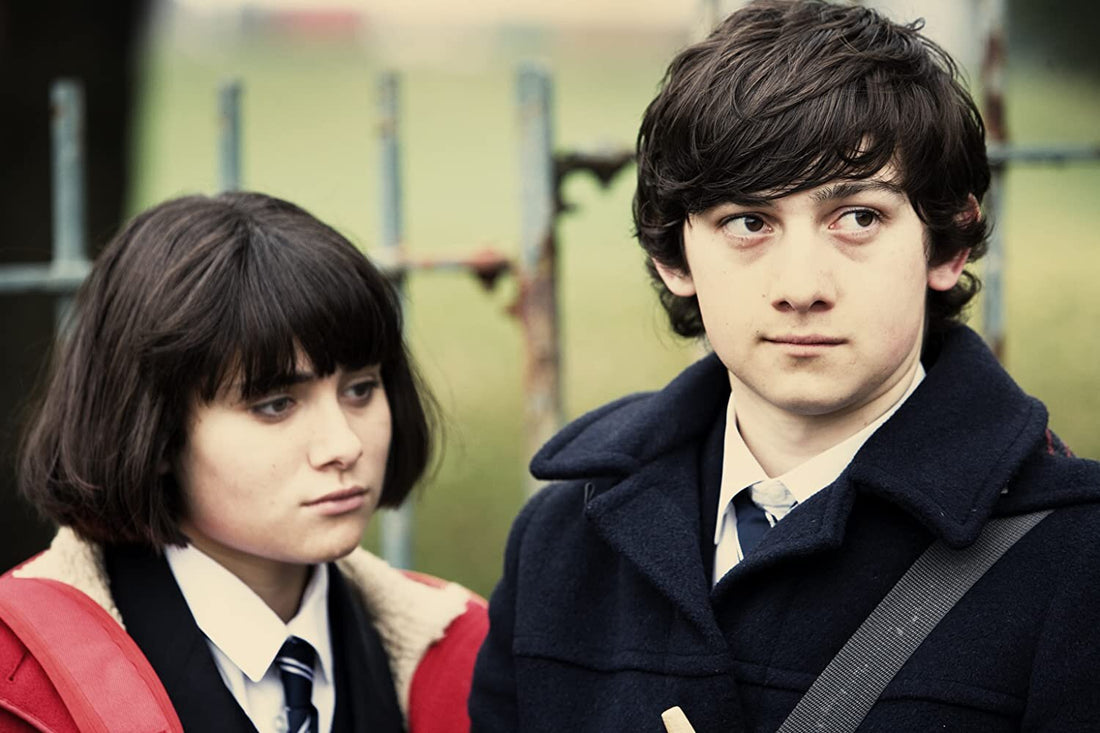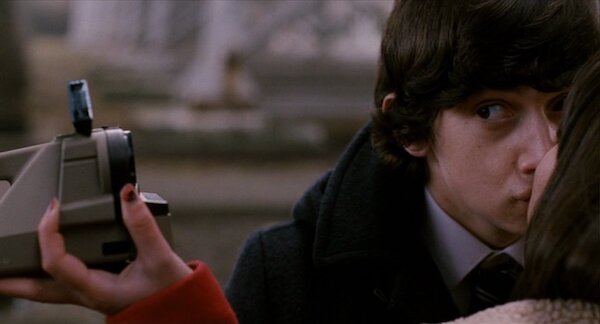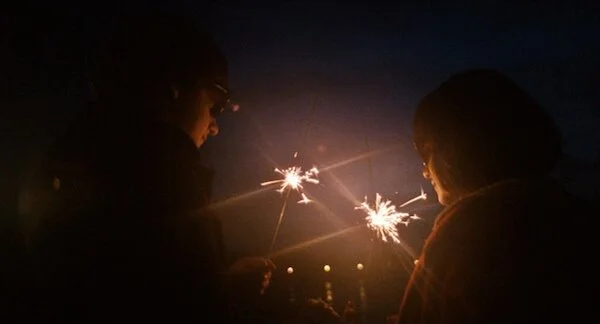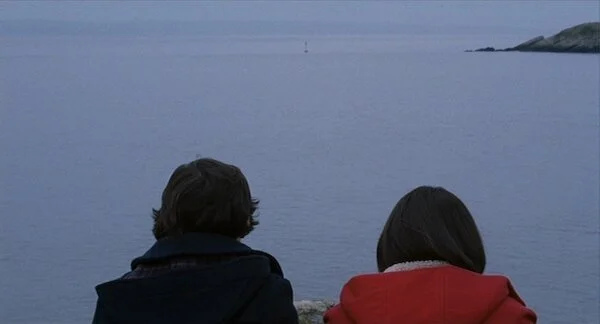Ten years after Richard Ayoade’s indie coming-of-ager premiered in Toronto, the legacy of its lovelorn characters feels knotty for those who cared for them. Remembering her own formative romance, Brianna Zigler reflects on the unknowable nature of love in Submarine.
For five years, I was fixated on a boy who would never love me back. He was cold-hearted and emotionally manipulative, often verbally cruel, disrespectful, and uncaring towards others. He didn’t love me back, and so I simply adored him. I adored him when he only wanted me for sex, I adored him when he made fun of me in front of his friends, I adored him through failed flings and relationships, his shining memory always clinging to the corner of my mind like a bat settled to roost in its grotto. And I adored him when he texted me years later, a sophomore in college, a different girl, and I told myself, “I’m in my twenties now. Things will be different this time.”
Love is more beautiful when it’s all in your head. You can find excuses for the nasty flaws and imperfections, perhaps make them endearing and, most importantly, acceptable, excusable, when you consider what paved the way for their existence. He’s been through the ringer, he’s tormented, he’s tragic. You can spend hours considering all the paths that led you here, and the paths that you could take to change things; it’s romantic, it’s exhilarating, it isn’t real. Because the have-nots always gain an edge over the haves. I’ve been loved before, and it’s never quite as fun. Where’s the excitement when you know exactly what to expect?
His name is Oliver Tate – no, not the boy I was in love with, but the boy who understood the inner machinations of my desire to be loved. I latched onto Richard Ayoade’s darkly whimsical take on Joe Dunthorne’s novel of the same name because it was how I wanted love to be. At 17, the line “You are the only person that I would allow to be shrunken down to a microscopic size and swim inside me in a tiny submersible machine” was pure poetry to me, no matter the motivation. I wanted my life to be a Super 8 montage while Alex Turner crooned about strobe lights and coconut shys. It didn’t matter that Oliver and his young lady, Jordana Bevan, were immature bullies with no grasp on the intricacies of true emotional connection. All that mattered was that they were in love.
But revisiting the film as a 25-year-old left a sour taste in my mouth. What once felt profound now felt contrived, its protagonists virulently unlikeable, its style kitsch as opposed to enchanting; on-the-nose, idiosyncratic dialogue far too reminiscent of films that came before. The sense of wonder and romantic desire that had filled me when watching Submarine in college had seemed to leave without a whisper in my body, as I inched my way through the 97-minute runtime thinking that it would never truly end. Most of the enjoyment I gained during my re-watch came from reminiscing on my love of yesteryear, trying to relive the same feelings that I had felt nearly a decade prior. So, when the credits rolled and I felt a slight sense of relief, I also had a few burning questions for myself. What worked for me when I was younger? What wasn’t working now? Had I really changed all that much?
Oliver Tate is narcissistic, arrogant, insecure and obsessed with controlling the narrative of his life, especially when it comes to romance. Not only does he want to gain an obsessive amount of surveillance over the sexual habits of his parents, the tenuous circumstances of their relationship and what he perceives to be their ensuing fallout, but he also wants a picture-perfect romance with the girl of his dreams – sans, perhaps, everything to do with romance at all. The film follows Oliver as he grapples with understanding that love and connection do not come without ugliness and the unknowable; that it is impossible to attempt to mould people to our liking, only concerned with creating beautiful, passing experiences with them, without creating artificiality. Oliver and Jordana’s brief, whirlwind romance coincides with Oliver’s parents’ worsening marital issues, culminating in a falling-out between him and Jordana, over his inability to face her grief over her mother’s cancer.
The narrative of Submarine has much to say about loving ideas about people more than loving people as whole, multifaceted individuals, both in the novel and the film adaptation. Oliver Tate lives mostly in his head, concocting extravagant fantasies and would-be scenarios that will never truly materialise. Oliver and Jordana’s romance comes about because Jordana takes staged, steamy photos of them making out to get back at her ex-boyfriend. Both Oliver and Jordana are vehemently opposed to displays of affection, but Oliver looks back on their passionate teenage revelry and mischief-making as if someone shot it on Super 8 film. And as soon as Jordana exposes her own weaknesses, Oliver can’t help but bail, out of fear. This isn’t particularly groundbreaking material, though – from Superbad to Rushmore to The Diary of a Teenage Girl, many coming-of-age films have been interested in exploring the way we experience love and affection as teenagers – intensely, lustfully, overwhelmingly and all at once, often times with people we don’t really know, and never end up fully knowing.
And so I realized that I once connected so much to the film not because I wanted either to be loved by a boy like Oliver, or to be an obsessive romantic like Oliver, but because of the way the film portrays the way I wanted to experience love. It suddenly felt shallow, because it is. Submarine the film ends up as the quintessence of its own story – beautiful, shallow, utterly fleeting and naïve. It only knows as much as its protagonists, which is little, if anything, and its visual storytelling embodies the sheer enormousness of loving as a teenager. How could I fully relate to a film that operates as the mind and heart of a high school student? It wasn’t what I had initially thought, which was that Oliver’s idealistic view of Jordana could be compared to my once-idealistic view of the movie – it’s as if the film is a teenager itself, working through the complexity of particular human emotions, which Oliver and Jordana are only just starting to understand work in shades of grey as opposed to black and white.
But to entirely separate myself from the content of the film is wrong. The concepts being tackled are not restricted to only teenagedom, as evidenced by Oliver’s parents’ marital struggles. Oliver ruminates to the audience on what he knows of his parents, Jill and Lloyd, through his boundary-crossing daily investigations. Lloyd has struggled with depression all his life, especially since losing his job, while Jill fixates on a former lover, Graham Purvis, who rolls into town, further deepening the chasm of their crumbling marriage. It seems that Jill is either unaware of, or disinterested in, the extent of Lloyd’s depression, and Lloyd is disinclined to believe anything adulterous could be going on between Jill and the man Lloyd stole her from (in his own words). Jill once dreamed of being an actress but now works in a dead-end office position, while Lloyd is a marine biologist recently fired from his job as a presenter for a local university’s television segment, now working in a university position that’s unfulfilling to him. Both are unhappy in their relationship, now mostly built on passive aggressive interactions and swathes of silence.
However, the revelation of Jill’s act of marital betrayal with Graham ultimately brings the two together, after Oliver is caught breaking into Graham’s house as revenge. Perhaps, it’s because it seems to be the first instance of real honesty between Lloyd and Jill in however long, and Oliver ends up catching the two of them cuddled in bed with the dimmer switch turned down. But still present all the same is this knowledge that there are universes within each of them that will never fully be revealed. Jill and Lloyd were both once people that no longer exist, and though being open and honest can bring people closer, the ocean is still six miles deep. The last we see of the two of them is in bed together, but we don’t know what will come after that. We only know as much as Oliver does.
At the end of the film, Oliver meets Jordana on the beach by chance, in the weeks following their messy break-up. Oliver runs to her, incredulous that it’s really her, as he’d previously had a vision of himself running to Jordana on the beach only for her to turn around and be greeted by the face of a stranger instead. The two stand side by side in the sand, only a few feet separating them. Oliver tries halfheartedly to apologize to Jordana, still finding it difficult to express his emotions properly, still managing to criticize Jordana. She calls him a dick. She tells him that he was horrible to her. Oliver tells her how deep the ocean is, and they fall silent. They start walking into the ocean together, still separated but now smiling at one another. As the ocean’s expanse stretches out before Oliver and Jordana, it’s as if that space between them will never truly close, and the space ahead of them will only continue to grow larger and larger until they someday disappear within it.
The reality of love is terrifying, and incomprehensible. “Reality of love” is a paradox because such a thing doesn’t exist. “I don’t know if I’ve come of age,” Oliver tells the audience in a voice-over, “but I’m certainly older now.” Indeed, it has now been nearly ten years since my fixation began with the unkind boy, and it ended long after it should have. Though I hold him in my memory with little fondness, the teenager who loved him and the 25-year-old who does not are still the same girl. I never really came of age, in this regard; I have found it safer, more reliable and, at the same time, exciting, to fixate on what someone could be, as opposed to what they are. I am older now, I see things differently, but at my core I still approach love in the same way. My most fulfilling relationships are the ones that never happened. I still write about him, don’t I? No, I am no longer a teenager, but I’m still the same girl who once loved Submarine.
Brianna Zigler (@briannazigs) is a freelance film writer based in the Philadelphia suburbs. She loves movies about sad boys and has words in Film School Rejects, Screen Queens, Vague Visages, Much Ado About Cinema, and more.




